◄ 1961 ►
Jan | Feb | Mar | Apr | May | Jun | Jul | Aug | Sep | Oct | Nov | Dec
| January | ► | ▲ | ||||
|---|---|---|---|---|---|---|
| 1 | 2 | 3 | 4 | 5 | 6 | 7 |
| 8 | 9 | 10 | 11 | 12 | 13 | 14 |
| 15 | 16 | 17 | 18 | 19 | 20 | 21 |
| 22 | 23 | 24 | 25 | 26 | 27 | 28 |
| 29 | 30 | 31 | ||||
![]() Jan 3: President Dwight D. Eisenhower severs diplomatic relations with Cuba.
Jan 3: President Dwight D. Eisenhower severs diplomatic relations with Cuba.
![]() Jan 8: French voters overwhelmingly approve Charles de Gaulle’s policies on Algerian Independence.
Jan 8: French voters overwhelmingly approve Charles de Gaulle’s policies on Algerian Independence.
![]()
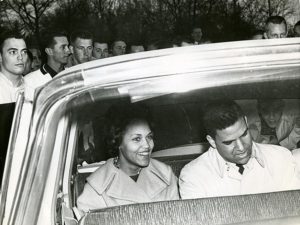 Jan 9: The University of Georgia admits its first African-American students, Charlayne Hunter and Hamilton E. Holmes, in compliance with a federal court order issued three days earlier. They are met with crowds shouting racial slurs and chanting, “Two, four, six, eight! We don’t want to integrate!”
Jan 9: The University of Georgia admits its first African-American students, Charlayne Hunter and Hamilton E. Holmes, in compliance with a federal court order issued three days earlier. They are met with crowds shouting racial slurs and chanting, “Two, four, six, eight! We don’t want to integrate!”
![]() Jan 11: A riot breaks out at the University of Georgia. It begins at Myers Hall, Charlayne Hunter’s dormitory, when students smash windows with bricks and bottles. Athens police, armed with tear gas, disperse the mob. Later that night, the university suspends Hunter and Hamilton Holmes. “in the interest of your personal safety and for the safety and welfare of more than 7,000 other students at the University of Georgia.” More than 400 faculty members will sign a resolution calling for the suspensions’ lifting. Hunter and Homes will be reinstated a few days later under a new court order.
Jan 11: A riot breaks out at the University of Georgia. It begins at Myers Hall, Charlayne Hunter’s dormitory, when students smash windows with bricks and bottles. Athens police, armed with tear gas, disperse the mob. Later that night, the university suspends Hunter and Hamilton Holmes. “in the interest of your personal safety and for the safety and welfare of more than 7,000 other students at the University of Georgia.” More than 400 faculty members will sign a resolution calling for the suspensions’ lifting. Hunter and Homes will be reinstated a few days later under a new court order.
![]() Jan 16: The U.S. bans travel by its citizens to Cuba.
Jan 16: The U.S. bans travel by its citizens to Cuba.
![]() Jan 17: President Dwight D. Eisenhower warns of the power of a “military-industrial complex” in his nationally-televised farewell address.
Jan 17: President Dwight D. Eisenhower warns of the power of a “military-industrial complex” in his nationally-televised farewell address.
![]()
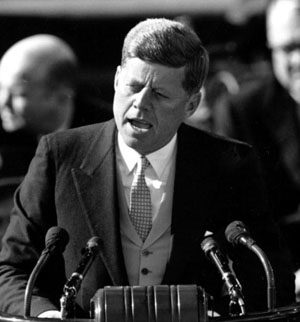 Jan 20: John F. Kennedy is sworn in as President of the United States. In his inaugural address, Kennedy proclaims that “the torch has been passed to a new generation of Americans,” and challenges Americans to “ask not what your country can do for you –- ask what you can do for your country.”
Jan 20: John F. Kennedy is sworn in as President of the United States. In his inaugural address, Kennedy proclaims that “the torch has been passed to a new generation of Americans,” and challenges Americans to “ask not what your country can do for you –- ask what you can do for your country.”
![]() Jan 24: A B-52 bomber, carrying two hydrogen bombs, breaks up in mid-air and crashes near Goldsboro, North Carolina. Three of the eight crew members are killed. The first five of the six safety switches on one of the bombs fail, allowing the bomb to execute most of its arming sequence. Only that last safety switch prevents a 24-megaton thermonuclear explosion.
Jan 24: A B-52 bomber, carrying two hydrogen bombs, breaks up in mid-air and crashes near Goldsboro, North Carolina. Three of the eight crew members are killed. The first five of the six safety switches on one of the bombs fail, allowing the bomb to execute most of its arming sequence. Only that last safety switch prevents a 24-megaton thermonuclear explosion.
![]() Jan 25: President Kennedy holds the first live televised presidential press conference. It is broadcast on all three TV networks.
Jan 25: President Kennedy holds the first live televised presidential press conference. It is broadcast on all three TV networks.
![]()
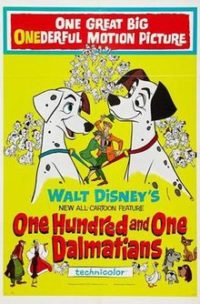 Jan 25: The Disney animated film One Hundred and One Dalmatians is released.
Jan 25: The Disney animated film One Hundred and One Dalmatians is released.
![]() Jan 27: Leontyne Price becomes the first African-American woman to perform at New York’s Metropolitan Opera House. She receives a 42-minute ovation for her role as Leonora in Il Trovatore.
Jan 27: Leontyne Price becomes the first African-American woman to perform at New York’s Metropolitan Opera House. She receives a 42-minute ovation for her role as Leonora in Il Trovatore.
![]() Jan 31: Georgia formally repeals segregation in its public schools when Gov. S. Ernest Vandivir signs the “open schools package” of legislation into law. Vandiver declares, “These are the four most important bills to be signed in this century in Georgia.”
Jan 31: Georgia formally repeals segregation in its public schools when Gov. S. Ernest Vandivir signs the “open schools package” of legislation into law. Vandiver declares, “These are the four most important bills to be signed in this century in Georgia.”
![]() Jan 31: African-American James Meredith applies for admission to the all-white University of Mississippi.
Jan 31: African-American James Meredith applies for admission to the all-white University of Mississippi.
![]()
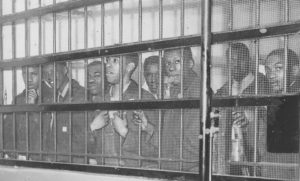 Jan 31: The first “jail-in” occurs when nine African-American students at Friendship Junior College are arrested in Rock Hill, South Carolina, for trying to order a meal at a segregated lunch counter. They decide to serve jail time rather than pay the fines, and are sentenced to 30 days of hard labor in the York County prison farm. They become known as the “Friendship Nine.” Authorities will give them a surprise early release two days before their thirty days are up in order to avoid news cameras.
Jan 31: The first “jail-in” occurs when nine African-American students at Friendship Junior College are arrested in Rock Hill, South Carolina, for trying to order a meal at a segregated lunch counter. They decide to serve jail time rather than pay the fines, and are sentenced to 30 days of hard labor in the York County prison farm. They become known as the “Friendship Nine.” Authorities will give them a surprise early release two days before their thirty days are up in order to avoid news cameras.
| ◄ | February | ► | ▲ | |||
|---|---|---|---|---|---|---|
| 1 | 2 | 3 | 4 | |||
| 5 | 6 | 7 | 8 | 9 | 10 | 11 |
| 12 | 13 | 14 | 15 | 16 | 17 | 18 |
| 19 | 20 | 21 | 22 | 23 | 24 | 25 |
| 26 | 27 | 28 | ||||
![]()
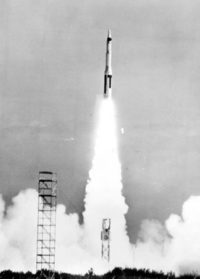 Feb 1: The U.S. tests its first Minuteman I intercontinental ballistic missile.
Feb 1: The U.S. tests its first Minuteman I intercontinental ballistic missile.
![]() Feb 1: The push-button “Touch-Tone” telephone enters public service for the first time. Bell Telephone introduces the new service to its customers in Findlay, Ohio, and Carnegie, Pennsylvania.
Feb 1: The push-button “Touch-Tone” telephone enters public service for the first time. Bell Telephone introduces the new service to its customers in Findlay, Ohio, and Carnegie, Pennsylvania.
![]() Feb 1: The film The Misfits is released. Based on the Henry Miller play, it stars Clark Gable (who had died just two months earlier), Marilyn Monroe, and Montgomery Clift. The film will be the last motion picture Marilyn Monroe completes before her death in 1962.
Feb 1: The film The Misfits is released. Based on the Henry Miller play, it stars Clark Gable (who had died just two months earlier), Marilyn Monroe, and Montgomery Clift. The film will be the last motion picture Marilyn Monroe completes before her death in 1962.
![]() Feb 4: The Portuguese Colonial War breaks out in Angola when an armed group attacks the prison, police barracks, a police patrol and the radio station in Luanda. The city’s white residents go on a rampage of revenge through Luanda’s black neighborhoods. The war will last fourteen years.
Feb 4: The Portuguese Colonial War breaks out in Angola when an armed group attacks the prison, police barracks, a police patrol and the radio station in Luanda. The city’s white residents go on a rampage of revenge through Luanda’s black neighborhoods. The war will last fourteen years.
![]()
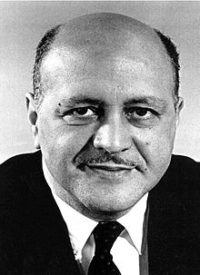 Feb 11: Robert C. Weaver becomes the first African-American to head a major U.S. government agency when President Kennedy appoints him to head the Housing and Home Finance Agency (the forerunner to the Department of Housing and Urban Development).
Feb 11: Robert C. Weaver becomes the first African-American to head a major U.S. government agency when President Kennedy appoints him to head the Housing and Home Finance Agency (the forerunner to the Department of Housing and Urban Development).
![]() Feb 12: The Miracles’ “Shop Around” becomes Motown’s first million-selling single.
Feb 12: The Miracles’ “Shop Around” becomes Motown’s first million-selling single.
![]() Feb 13: Rebels in Elisabethville, Congo (Léopoldville) announce that former Prime Minister Patrice Lumumba was killed a month earlier “by the inhabitants of a little village” after escaping from prison. It will turn out that Lumumba was executed by a secessionist Katanga provincial firing squad with the participation of Belgian officers on January 17. The announcement of Lumumba’s death sparks rioting and demonstrations throughout the Congo and at Belgian embassies around the world.
Feb 13: Rebels in Elisabethville, Congo (Léopoldville) announce that former Prime Minister Patrice Lumumba was killed a month earlier “by the inhabitants of a little village” after escaping from prison. It will turn out that Lumumba was executed by a secessionist Katanga provincial firing squad with the participation of Belgian officers on January 17. The announcement of Lumumba’s death sparks rioting and demonstrations throughout the Congo and at Belgian embassies around the world.
![]() Feb 15: A Sabena Airlines Boeing 707 crashes near Brussels, Belgium, killing 73. Among the dead are the entire U.S. figure skating team and several coaches.
Feb 15: A Sabena Airlines Boeing 707 crashes near Brussels, Belgium, killing 73. Among the dead are the entire U.S. figure skating team and several coaches.
| ◄ | March | ► | ▲ | |||
|---|---|---|---|---|---|---|
| 1 | 2 | 3 | 4 | |||
| 5 | 6 | 7 | 8 | 9 | 10 | 11 |
| 12 | 13 | 14 | 15 | 16 | 17 | 18 |
| 19 | 20 | 21 | 22 | 23 | 24 | 25 |
| 26 | 27 | 28 | 29 | 30 | 31 | |
![]() Mar 1: President John F. Kennedy establishes the Peace Corps.
Mar 1: President John F. Kennedy establishes the Peace Corps.
![]() Mar 1: The British colony of Uganda becomes self-governing following general elections. It will achieve full independence a year later.
Mar 1: The British colony of Uganda becomes self-governing following general elections. It will achieve full independence a year later.
![]() Mar 16: A B-52 crashes near Yuba City, California, after losing cabin pressure and running out of fuel. Two nuclear weapons are found unexploded.
Mar 16: A B-52 crashes near Yuba City, California, after losing cabin pressure and running out of fuel. Two nuclear weapons are found unexploded.
![]() Mar 29: The Twenty-Third Amendment to the U.S. Constitution is ratified, allowing residents of the District of Columbia to vote in presidential elections.
Mar 29: The Twenty-Third Amendment to the U.S. Constitution is ratified, allowing residents of the District of Columbia to vote in presidential elections.
| ◄ | April | ► | ▲ | |||
|---|---|---|---|---|---|---|
| 1 | ||||||
| 2 | 3 | 4 | 5 | 6 | 7 | 8 |
| 9 | 10 | 11 | 12 | 13 | 14 | 15 |
| 16 | 17 | 18 | 19 | 20 | 21 | 22 |
| 23 | 24 | 25 | 26 | 27 | 28 | 29 |
| 30 | ||||||
![]() Apr 11: The war crimes trial of Adolf Eichmann begins in Israel. As a Nazi SS Lieutenant Colonel, he was tasked with facilitating and managing the logistics of carrying out to “Final Solution.”
Apr 11: The war crimes trial of Adolf Eichmann begins in Israel. As a Nazi SS Lieutenant Colonel, he was tasked with facilitating and managing the logistics of carrying out to “Final Solution.”
![]()
 Apr 12: Soviet cosmonaut Yuri Gagarin becomes the first human in space. He makes one complete orbit before returning to Earth. The entire flight lasts one hour and forty-eight minutes.
Apr 12: Soviet cosmonaut Yuri Gagarin becomes the first human in space. He makes one complete orbit before returning to Earth. The entire flight lasts one hour and forty-eight minutes.
![]() Apr 15: In preparation for a planned invasion of Cuba by Cuban exiles, eight B-26B bombers, painted with false flag markings of the Cuban air force and piloted by crews of Cuban exiles, attack three Cuban airfields. The aim is to destroy Cuba’s armed aircraft ahead of the main invasion.
Apr 15: In preparation for a planned invasion of Cuba by Cuban exiles, eight B-26B bombers, painted with false flag markings of the Cuban air force and piloted by crews of Cuban exiles, attack three Cuban airfields. The aim is to destroy Cuba’s armed aircraft ahead of the main invasion.
![]()
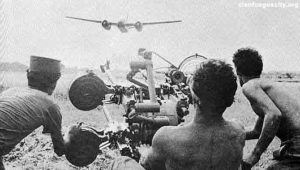 Apr 17: Thousands of Cuban exiles begin an invasion of Cuba at the the Bay of Pigs. They are backed by aircraft flown by Cuban exiles and CIA-hired crewmen, and escorted to Cuban waters by a U.S. Navy task force. In three days of fighting, four Americans of the Alabama National Guard employed by the CIA will be killed, along with 114 invaders and 176 Cuban ground forces. As the invasion collapses under Cuban air and ground attacks, 1,189 invaders are captured as prisoners of war and tried for treason.
Apr 17: Thousands of Cuban exiles begin an invasion of Cuba at the the Bay of Pigs. They are backed by aircraft flown by Cuban exiles and CIA-hired crewmen, and escorted to Cuban waters by a U.S. Navy task force. In three days of fighting, four Americans of the Alabama National Guard employed by the CIA will be killed, along with 114 invaders and 176 Cuban ground forces. As the invasion collapses under Cuban air and ground attacks, 1,189 invaders are captured as prisoners of war and tried for treason.
![]()
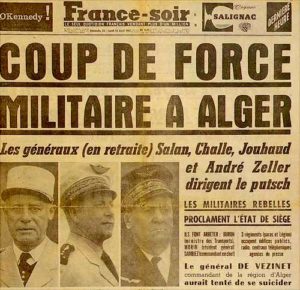 Apr 22: Four retired right-wing French generals launch a coup attempt in Algeria to prevent the transfer of power from France to Algerian nationals. More than 2,000 paratroopers seize control of the principal cities in Algeria. Fearing that the coup will spread to France itself, President Charles De Gaulle orders loyal troops to fight the coup forces.
Apr 22: Four retired right-wing French generals launch a coup attempt in Algeria to prevent the transfer of power from France to Algerian nationals. More than 2,000 paratroopers seize control of the principal cities in Algeria. Fearing that the coup will spread to France itself, President Charles De Gaulle orders loyal troops to fight the coup forces.
![]() Apr 23: For the first and only time in the history of the Fifth Republic, French President Charles De Gaul invokes emergency powers under Article 16 of the constitution. He will retain special powers for five months following the Algerian coup attempt.
Apr 23: For the first and only time in the history of the Fifth Republic, French President Charles De Gaul invokes emergency powers under Article 16 of the constitution. He will retain special powers for five months following the Algerian coup attempt.
![]()
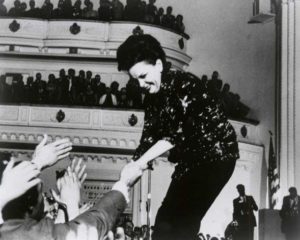 Apr 23: Judy Garland performs her legendary comeback concert at Carnegie Hall. Variety will call it “the greatest night in show business history.” The concert is recorded and will be released as the Grammy award-winning album, Judy at Carnegie Hall.
Apr 23: Judy Garland performs her legendary comeback concert at Carnegie Hall. Variety will call it “the greatest night in show business history.” The concert is recorded and will be released as the Grammy award-winning album, Judy at Carnegie Hall.
![]() Apr 25: Fearing that an atomic bomb might fall into the hands of rebel French troops in Algeria, France detonates that last of its plutonium fission devices in the Sahara Desert.
Apr 25: Fearing that an atomic bomb might fall into the hands of rebel French troops in Algeria, France detonates that last of its plutonium fission devices in the Sahara Desert.
![]() Apr 26: The attempted coup in Algeria is put down with the surrender of Gens. Maurice Challe and André Zeller, two of the coup plotters, along with most of the rebelling soldiers. The other two rebel generals, Raoul Salan and Edmond Jougaud, will remain at large. They will establish the underground Organisation Armée Secrète (Secret Army Organization, or OAS) as a right-wing terrorist group dedicated to resisting the return of control of Algeria to Algerians.
Apr 26: The attempted coup in Algeria is put down with the surrender of Gens. Maurice Challe and André Zeller, two of the coup plotters, along with most of the rebelling soldiers. The other two rebel generals, Raoul Salan and Edmond Jougaud, will remain at large. They will establish the underground Organisation Armée Secrète (Secret Army Organization, or OAS) as a right-wing terrorist group dedicated to resisting the return of control of Algeria to Algerians.
![]() Apr 27: Sierra Leone becomes independent from Britain.
Apr 27: Sierra Leone becomes independent from Britain.
![]() Apr 27: The film The Guns of Navarone premieres in London.
Apr 27: The film The Guns of Navarone premieres in London.
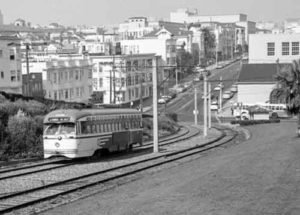 Apr 29: The San Francisco streetcar murder. Shortly after midnight early in the morning, William P. Hall, 27, is waiting near his San Francisco home for a streetcar on the J line at 19th and Church Street alongside Dolores Park. He is on his way to a late dinner date with a theater manager at a North Beach pizza parlor. A car pulls up and three youths, Larry Magee, 16, Robert Hall, 17, (and no relation to William Hall), and William Castillo, 17 pile out. Magee asks William Hall, “Are you a queer?” Hall replied, “What if I asked you that question?” The teens beat Hall mercilessly, steal his wallet containing $2.85, and leave him lying on the streetcar tracks. A few minutes after they leave, a streetcar comes around the corner. The motorman can’t stop in time and Hall is “ground to death beneath the wheels,” according to one of the more prosaic news report. The four teens are arrested a week later, charged with first degree murder, tried as adults and found guilty, and sentenced to life imprisonment, although they would be eligible for parole after seven years.
Apr 29: The San Francisco streetcar murder. Shortly after midnight early in the morning, William P. Hall, 27, is waiting near his San Francisco home for a streetcar on the J line at 19th and Church Street alongside Dolores Park. He is on his way to a late dinner date with a theater manager at a North Beach pizza parlor. A car pulls up and three youths, Larry Magee, 16, Robert Hall, 17, (and no relation to William Hall), and William Castillo, 17 pile out. Magee asks William Hall, “Are you a queer?” Hall replied, “What if I asked you that question?” The teens beat Hall mercilessly, steal his wallet containing $2.85, and leave him lying on the streetcar tracks. A few minutes after they leave, a streetcar comes around the corner. The motorman can’t stop in time and Hall is “ground to death beneath the wheels,” according to one of the more prosaic news report. The four teens are arrested a week later, charged with first degree murder, tried as adults and found guilty, and sentenced to life imprisonment, although they would be eligible for parole after seven years.![]() Apr 30: Del Shannon’s single “Runaway” begins its four week run at the top of the charts.
Apr 30: Del Shannon’s single “Runaway” begins its four week run at the top of the charts.
| ◄ | May | ► | ▲ | |||
|---|---|---|---|---|---|---|
| 1 | 2 | 3 | 4 | 5 | 6 | |
| 7 | 8 | 9 | 10 | 11 | 12 | 13 |
| 14 | 15 | 16 | 17 | 18 | 19 | 20 |
| 21 | 22 | 23 | 24 | 25 | 26 | 27 |
| 28 | 29 | 30 | 31 | |||
![]()
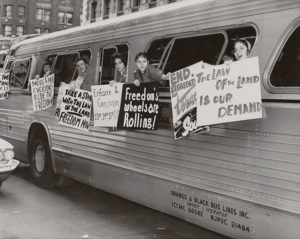 May 4: Thirteen Freedom Riders leave Washington, D.C. and begin integrated interstate bus rides. Their goal is to test the December 5, 1960, U.S. Supreme Court decision outlawing racial segregation in restaurants and waiting rooms in terminals serving buses that cross state lines. Over the next three weeks, an estimated 300 riders will join them in bus rides throughout the South.
May 4: Thirteen Freedom Riders leave Washington, D.C. and begin integrated interstate bus rides. Their goal is to test the December 5, 1960, U.S. Supreme Court decision outlawing racial segregation in restaurants and waiting rooms in terminals serving buses that cross state lines. Over the next three weeks, an estimated 300 riders will join them in bus rides throughout the South.
![]()
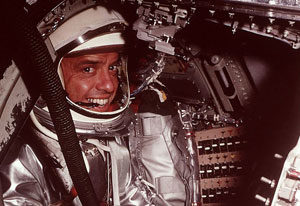 May 5: Alan Shepard becomes the first American in space, although he does not achieve earth orbit. His flight lasts nineteen minutes.
May 5: Alan Shepard becomes the first American in space, although he does not achieve earth orbit. His flight lasts nineteen minutes.
![]() May 9: FCC chairman Newton N. Minow describes commercial television as a “vast wasteland” in an address before the National Association of Broadcasters.
May 9: FCC chairman Newton N. Minow describes commercial television as a “vast wasteland” in an address before the National Association of Broadcasters.
![]()
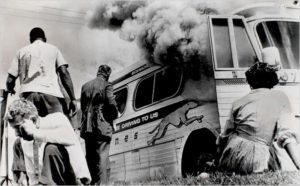 May 14: A Greyhound bus carrying nine Freedom Riders is firebombed near Anniston, Alabama, and riders are beaten by a mob. A Trailways bus carrying seven more Freedom Riders arrives in Birmingham, where two of the riders are beaten.
May 14: A Greyhound bus carrying nine Freedom Riders is firebombed near Anniston, Alabama, and riders are beaten by a mob. A Trailways bus carrying seven more Freedom Riders arrives in Birmingham, where two of the riders are beaten.
![]() May 16: A military coup in South Korea overthrows the government of Prime Minister Chang Myon and President Yung Po Sun. Gen Park Chung Hee is installed as the new President.
May 16: A military coup in South Korea overthrows the government of Prime Minister Chang Myon and President Yung Po Sun. Gen Park Chung Hee is installed as the new President.
![]()
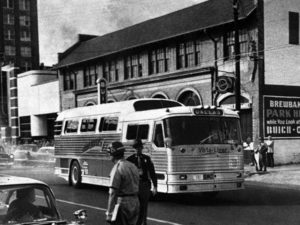 May 20: An integrated Freedom Riders bus enters Montgomery, Alabama with a police escort. As the bus enters the city, the police escort leaves, and the bus continues through the city streets unprotected. When the bus arrives at the station, the riders are at the mercy of a waiting mob. Several riders and a U.S. Justice Department representative are beaten. Six hundred federal marshals will be sent to Montgomery later that day.
May 20: An integrated Freedom Riders bus enters Montgomery, Alabama with a police escort. As the bus enters the city, the police escort leaves, and the bus continues through the city streets unprotected. When the bus arrives at the station, the riders are at the mercy of a waiting mob. Several riders and a U.S. Justice Department representative are beaten. Six hundred federal marshals will be sent to Montgomery later that day.
![]()
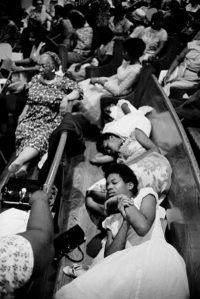 May 21: Rev. Martin Luther King arrives in Montgomery, Alabama to support the Freedom Riders. While speaking at the First Baptist Church, several thousand whites surround the building and threaten those inside despite the presence of federal marshals protecting the church. With those inside fearing for their lives, King phones Attorney General Robert Kennedy. Kennedy calls Gov. John Patterson, who orders police and the Alabama National Guard to disperse the crowd.
May 21: Rev. Martin Luther King arrives in Montgomery, Alabama to support the Freedom Riders. While speaking at the First Baptist Church, several thousand whites surround the building and threaten those inside despite the presence of federal marshals protecting the church. With those inside fearing for their lives, King phones Attorney General Robert Kennedy. Kennedy calls Gov. John Patterson, who orders police and the Alabama National Guard to disperse the crowd.
![]() May 23: Civil rights leaders James Farmer, John Lewis, Ralph Abernathy and Martin Luther King Jr. hold a news conference in Montgomery, Alabama and announce that the Freedom Rides will continue. Lewis is wearing bandages from the beating he received in Montgomery three days earlier.
May 23: Civil rights leaders James Farmer, John Lewis, Ralph Abernathy and Martin Luther King Jr. hold a news conference in Montgomery, Alabama and announce that the Freedom Rides will continue. Lewis is wearing bandages from the beating he received in Montgomery three days earlier.
![]()
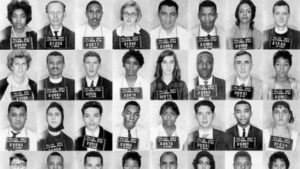 May 24: Twenty-seven Freedom Riders are arrested in Jackson, Mississippi for “disturbing the peace” when they disembark from two Greyhound buses.
May 24: Twenty-seven Freedom Riders are arrested in Jackson, Mississippi for “disturbing the peace” when they disembark from two Greyhound buses.
![]() May 25: The Freedom Riders arrested in Jackson, Mississippi, go on trial. As the defense attorney speaks, the judge turns his back and looks at the wall. The judge finds the defendants guilty and sentences many of them them to sixty days at Mississippi’s worst state prison at Parchman. Over the next few months, police will arrest more than 400 Freedom riders.
May 25: The Freedom Riders arrested in Jackson, Mississippi, go on trial. As the defense attorney speaks, the judge turns his back and looks at the wall. The judge finds the defendants guilty and sentences many of them them to sixty days at Mississippi’s worst state prison at Parchman. Over the next few months, police will arrest more than 400 Freedom riders.
![]() May 25: During a joint session of Congress, President John F. Kennedy declares, “I believe this nation should commit itself to achieving the goal, before this decade is out, of landing a man on the Moon and returning him safely to the earth.”
May 25: During a joint session of Congress, President John F. Kennedy declares, “I believe this nation should commit itself to achieving the goal, before this decade is out, of landing a man on the Moon and returning him safely to the earth.”
![]() May 31: The Union of South Africa becomes the Republic of South Africa and leaves the British Commonwealth of Nations.
May 31: The Union of South Africa becomes the Republic of South Africa and leaves the British Commonwealth of Nations.
| ◄ | June | ► | ▲ | |||
|---|---|---|---|---|---|---|
| 1 | 2 | 3 | ||||
| 4 | 5 | 6 | 7 | 8 | 9 | 10 |
| 11 | 12 | 13 | 14 | 15 | 16 | 17 |
| 18 | 19 | 20 | 21 | 22 | 23 | 24 |
| 25 | 26 | 27 | 28 | 29 | 30 | |
![]()
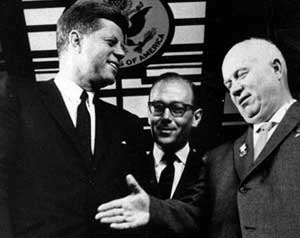 Jun 3-4: President John F. Kennedy and Soviet Premier Nikita Khrushchev meet for two days in Vienna. The two agreed to meet despite there being no agenda for the talks. The summit breaks down into a free-for-all between Kennedy and Khrushchev. At one point, Kennedy reminds Khrushchev that a nuclear war will kill 70 million people in 10 minutes; Khrushchev responds, “So, what?” Latter in the Summit, Khrushchev tells Kennedy, “It is up to the U.S. to decide whether there will be war or peace,” Kennedy responds, “Then, Mr. Chairman there will be war. It will be a cold winter.” The summit will be scored a disaster for Kennedy. Khrushchev, sensing weakness, will respond by resuming above-ground nuclear tests. He will also order the East Germans to begin building the Berlin Wall, and two years later will try to deploy nuclear missiles in Cuba.
Jun 3-4: President John F. Kennedy and Soviet Premier Nikita Khrushchev meet for two days in Vienna. The two agreed to meet despite there being no agenda for the talks. The summit breaks down into a free-for-all between Kennedy and Khrushchev. At one point, Kennedy reminds Khrushchev that a nuclear war will kill 70 million people in 10 minutes; Khrushchev responds, “So, what?” Latter in the Summit, Khrushchev tells Kennedy, “It is up to the U.S. to decide whether there will be war or peace,” Kennedy responds, “Then, Mr. Chairman there will be war. It will be a cold winter.” The summit will be scored a disaster for Kennedy. Khrushchev, sensing weakness, will respond by resuming above-ground nuclear tests. He will also order the East Germans to begin building the Berlin Wall, and two years later will try to deploy nuclear missiles in Cuba.
![]() Jun 8: American civil rights lawyer Mary Bonauto is born. She will serve as co-counsel for Baker v. Vermont (resulting in civil unions in Vermont), lead counsel for Goodridge v. Mass Dept Public Health (resulting in marriage equality in Massachussets, lead counsel for Gill v. OPM (striking down the Defense of Marriage Act as unconstitutional), and as litigant for Obergefell v. Hodges (striking down bans on same-sex marriage).
Jun 8: American civil rights lawyer Mary Bonauto is born. She will serve as co-counsel for Baker v. Vermont (resulting in civil unions in Vermont), lead counsel for Goodridge v. Mass Dept Public Health (resulting in marriage equality in Massachussets, lead counsel for Gill v. OPM (striking down the Defense of Marriage Act as unconstitutional), and as litigant for Obergefell v. Hodges (striking down bans on same-sex marriage).
![]() Jun 14: English singer, songwriter, DJ and former Culture Club frontman Boy George is born.
Jun 14: English singer, songwriter, DJ and former Culture Club frontman Boy George is born.
![]() Jun 16: Russian ballet dancer Rudolf Nureyev requests asylum in France while touring with the Kirov Ballet.
Jun 16: Russian ballet dancer Rudolf Nureyev requests asylum in France while touring with the Kirov Ballet.
![]() Jun 19: The British protectorate over Kuwait comes to an end, and Kuwait becomes a fully independent nation.
Jun 19: The British protectorate over Kuwait comes to an end, and Kuwait becomes a fully independent nation.
![]() Jun 22: Scottish singer, songwriter, and former Bronski Beat frontman Jimmy Somerville is born.
Jun 22: Scottish singer, songwriter, and former Bronski Beat frontman Jimmy Somerville is born.
![]()
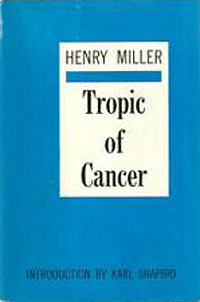 Jun 24: Grove Press releases Henry Miller’s Tropic of Cancer in the United States, 27 years after its original publication in France. The book leads to one of many obscenity trials (Grove Press, Inc., v. Gerstein) that will test American obscenity laws.
Jun 24: Grove Press releases Henry Miller’s Tropic of Cancer in the United States, 27 years after its original publication in France. The book leads to one of many obscenity trials (Grove Press, Inc., v. Gerstein) that will test American obscenity laws.
![]() Jun 25: President John F. Kennedy, in a national televised speech on the continuing Berlin crisis, vows “we will not be driven out of Berlin.” He calls for a stepped-up civil defense program and urges Americans to build fallout shelters.
Jun 25: President John F. Kennedy, in a national televised speech on the continuing Berlin crisis, vows “we will not be driven out of Berlin.” He calls for a stepped-up civil defense program and urges Americans to build fallout shelters.
![]() Jun 26: After going into hiding in South Africa to avoid arrest, African National Congress leader Nelson Mandela issues the manifesto, “The Struggle Is My Life.” This marks the ANC’s change in tactics from passive resistance to armed struggle.
Jun 26: After going into hiding in South Africa to avoid arrest, African National Congress leader Nelson Mandela issues the manifesto, “The Struggle Is My Life.” This marks the ANC’s change in tactics from passive resistance to armed struggle.
| ◄ | July | ► | ▲ | |||
|---|---|---|---|---|---|---|
| 1 | ||||||
| 2 | 3 | 4 | 5 | 6 | 7 | 8 |
| 9 | 10 | 11 | 12 | 13 | 14 | 15 |
| 16 | 17 | 18 | 19 | 20 | 21 | 22 |
| 23 | 24 | 25 | 26 | 27 | 28 | 29 |
| 30 | 31 | |||||
![]() Jul 2: Ernest Hemingway commits suicide at the age of 61.
Jul 2: Ernest Hemingway commits suicide at the age of 61.
![]() Jul 15: American politician David Cicilline is born. He will become a Democratic Congressman from Rhode Island.
Jul 15: American politician David Cicilline is born. He will become a Democratic Congressman from Rhode Island.
![]() Jul 16: Bobby Lewis’s single “Tossin’ and Turnin'” begins its seven week run at the top of the charts.
Jul 16: Bobby Lewis’s single “Tossin’ and Turnin'” begins its seven week run at the top of the charts.
![]()
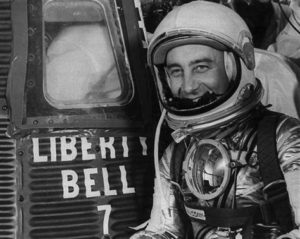 Jul 21: Gus Grissom becomes the second American astronaut to go into space. His 16-minute flight nearly ends in disaster when the hatch of Liberty Bell 7 prematurely opens during splashdown, and the capsule fills with water and begins to sink. Grissom is able to escape, but he nearly drowns when his spacesuit fills with water. He is rescued, but the capsule sinks. Soon after his recuse, a 10-foot long shark is observed in the area.
Jul 21: Gus Grissom becomes the second American astronaut to go into space. His 16-minute flight nearly ends in disaster when the hatch of Liberty Bell 7 prematurely opens during splashdown, and the capsule fills with water and begins to sink. Grissom is able to escape, but he nearly drowns when his spacesuit fills with water. He is rescued, but the capsule sinks. Soon after his recuse, a 10-foot long shark is observed in the area.
![]() Jul 25: President Kennedy delivers a nationally televised address to announce that if the Soviet Union tries to take control of West Berlin, the U.S. will be prepared to respond with force. He orders a draft call to increase the U.S. army from 875,000 to 1 million men. He also asks Congress to set up a network of fallout shelters and upgrade the emergency warning system.
Jul 25: President Kennedy delivers a nationally televised address to announce that if the Soviet Union tries to take control of West Berlin, the U.S. will be prepared to respond with force. He orders a draft call to increase the U.S. army from 875,000 to 1 million men. He also asks Congress to set up a network of fallout shelters and upgrade the emergency warning system.
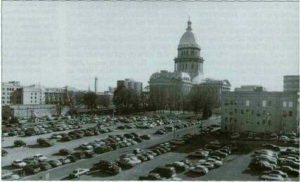 Jul 28: Illinois repeals its sodomy law while revising its criminal code. In 1955, the Illinois General Assembly inaugurated the gargantuan task of overhauling its criminal code. Since its last major revision in 1874, the code had accumulated a patchwork of conflicting and confusing statues, some of which made no sense in the 20th century. Horse thieves, for example, were punished with a minimum penalty of three years in prison, but the maximum penalty for auto theft was only one year. Over the ensuing six years, an eighteen-member joint committee of the Chicago and Illinois Bar Associations combed through the 148 chapters and 832 sections of the old statute books, using the American Law Institute’s 1956 Model Penal Code as a guide. The ALI had put together its Model Penal Code because a number of states were planning to revise their criminal codes over the next decade, and the 1956 Model Code was intended to guide them through the process. Among its many recommendations was the elimination of all prohibitions against adult consensual sexual activity, including those laws which criminalized homosexual activity and relationships. Due to the massive overhaul of the entire criminal code, it’s likely that most Illinois lawmakers don’t realize that they are repealing their anti-sodomy law by adopting the omnibus legislation. Nevertheless, the code is approved and signed into law by Gov. Otto Kerner. The criminal code, along with the old anti-sodomy law’s repeal, will go into effect on January 1, 1962.
Jul 28: Illinois repeals its sodomy law while revising its criminal code. In 1955, the Illinois General Assembly inaugurated the gargantuan task of overhauling its criminal code. Since its last major revision in 1874, the code had accumulated a patchwork of conflicting and confusing statues, some of which made no sense in the 20th century. Horse thieves, for example, were punished with a minimum penalty of three years in prison, but the maximum penalty for auto theft was only one year. Over the ensuing six years, an eighteen-member joint committee of the Chicago and Illinois Bar Associations combed through the 148 chapters and 832 sections of the old statute books, using the American Law Institute’s 1956 Model Penal Code as a guide. The ALI had put together its Model Penal Code because a number of states were planning to revise their criminal codes over the next decade, and the 1956 Model Code was intended to guide them through the process. Among its many recommendations was the elimination of all prohibitions against adult consensual sexual activity, including those laws which criminalized homosexual activity and relationships. Due to the massive overhaul of the entire criminal code, it’s likely that most Illinois lawmakers don’t realize that they are repealing their anti-sodomy law by adopting the omnibus legislation. Nevertheless, the code is approved and signed into law by Gov. Otto Kerner. The criminal code, along with the old anti-sodomy law’s repeal, will go into effect on January 1, 1962.| ◄ | August | ► | ▲ | |||
|---|---|---|---|---|---|---|
| 1 | 2 | 3 | 4 | 5 | ||
| 6 | 7 | 8 | 9 | 10 | 11 | 12 |
| 13 | 14 | 15 | 16 | 17 | 18 | 19 |
| 20 | 21 | 22 | 23 | 24 | 25 | 26 |
| 27 | 28 | 29 | 30 | 31 | ||
![]() Aug 4: Barack Obama is born in Honolulu Hawaii in the Kapi’olani Medical Center for Women and Children. Hawaii’s State Department of Health has his birth certificate, in case anyone wants to check.
Aug 4: Barack Obama is born in Honolulu Hawaii in the Kapi’olani Medical Center for Women and Children. Hawaii’s State Department of Health has his birth certificate, in case anyone wants to check.
![]() Aug 5: At the end of a Warsaw Pact meeting in Moscow, Pact nations announce that they will sign a separate peace treaty with East Germany with the objective of ending American, British and French occupation of West Berlin. That day, the number of East Germans fleeing into West Berlin tops 1,500 people, or more than one per minute.
Aug 5: At the end of a Warsaw Pact meeting in Moscow, Pact nations announce that they will sign a separate peace treaty with East Germany with the objective of ending American, British and French occupation of West Berlin. That day, the number of East Germans fleeing into West Berlin tops 1,500 people, or more than one per minute.
![]()
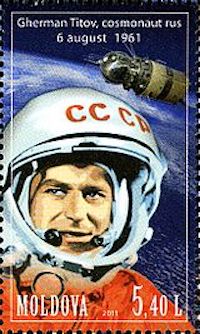 Aug 6: Soviet cosmonaut Gherman Titov becomes the second human to reach earth orbit on Vostok 2. His 25 hour and 18 minute flight makes him the first human to be in space for more than a day and the first human to sleep while in space. The flight completes 17½ orbits. At 25 years of age, Titov remains the youngest person ever sent to space. The next day, Congress will quickly approve $1.7 billion for the U.S. space program.
Aug 6: Soviet cosmonaut Gherman Titov becomes the second human to reach earth orbit on Vostok 2. His 25 hour and 18 minute flight makes him the first human to be in space for more than a day and the first human to sleep while in space. The flight completes 17½ orbits. At 25 years of age, Titov remains the youngest person ever sent to space. The next day, Congress will quickly approve $1.7 billion for the U.S. space program.
![]()
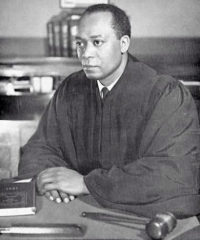 Aug 9: James Benton Parsons becomes the first African-American to be nominated for a federal judgeship. The Senate will confirm his nomination on August 30. He will serve as federal judge for the Northern District of Illinois until his death in 1993.
Aug 9: James Benton Parsons becomes the first African-American to be nominated for a federal judgeship. The Senate will confirm his nomination on August 30. He will serve as federal judge for the Northern District of Illinois until his death in 1993.
![]() Aug 12: A record 2,662 East Germans escape into West Berlin on the last full day before the border is closed.
Aug 12: A record 2,662 East Germans escape into West Berlin on the last full day before the border is closed.
![]()
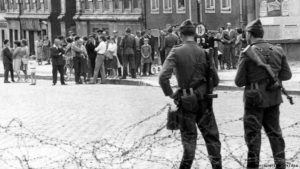 Aug 13: A barbed-wire fence is erected along the line between East and West Berlin at 2:00 a.m. local time. Trenches are dug across streets crossing the border and railroad lines are closed. The official corridors used by the western allies through East Germany connecting West Berlin to West Germany remain open. Construction of the Berlin Wall begins soon after.
Aug 13: A barbed-wire fence is erected along the line between East and West Berlin at 2:00 a.m. local time. Trenches are dug across streets crossing the border and railroad lines are closed. The official corridors used by the western allies through East Germany connecting West Berlin to West Germany remain open. Construction of the Berlin Wall begins soon after.
![]() Aug 14: The Brandenburg Gate is closed at 1:00 p.m. local time after a crowed of 5,000 West Berlin protesters throw rocks at East German soldiers. The soldiers respond with tear gas and water cannons.
Aug 14: The Brandenburg Gate is closed at 1:00 p.m. local time after a crowed of 5,000 West Berlin protesters throw rocks at East German soldiers. The soldiers respond with tear gas and water cannons.
![]()
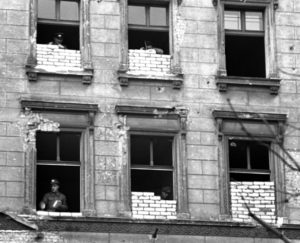 Aug 18: East German leader Walter Ulbricht orders border troops to brick up the entrances and windows of buildings facing West Berlin along the border. Civilian workers begin building the Berlin Wall under the watchful eyes of border guards who have orders to shoot any employee who tries to flee to West Berlin.
Aug 18: East German leader Walter Ulbricht orders border troops to brick up the entrances and windows of buildings facing West Berlin along the border. Civilian workers begin building the Berlin Wall under the watchful eyes of border guards who have orders to shoot any employee who tries to flee to West Berlin.
![]() Aug 27: American fashion designer Tom Ford is born.
Aug 27: American fashion designer Tom Ford is born.
![]() Aug 31: The Soviet Union announces that it is ending a three-year worldwide moratorium on nuclear testing, and will detonate a nuclear weapon the next day. The Soviets will detonate 45 bombs over the next 65 days.
Aug 31: The Soviet Union announces that it is ending a three-year worldwide moratorium on nuclear testing, and will detonate a nuclear weapon the next day. The Soviets will detonate 45 bombs over the next 65 days.
| ◄ | September | ► | ▲ | |||
|---|---|---|---|---|---|---|
| 1 | 2 | |||||
| 3 | 4 | 5 | 6 | 7 | 8 | 9 |
| 10 | 11 | 12 | 13 | 14 | 15 | 16 |
| 17 | 18 | 19 | 20 | 21 | 22 | 23 |
| 24 | 25 | 26 | 27 | 28 | 29 | 30 |
![]() Sep 5: After the Soviets detonated its third nuclear device in a week, President John F. Kennedy announces that the U.S. will end its own moratorium on nuclear testing.
Sep 5: After the Soviets detonated its third nuclear device in a week, President John F. Kennedy announces that the U.S. will end its own moratorium on nuclear testing.
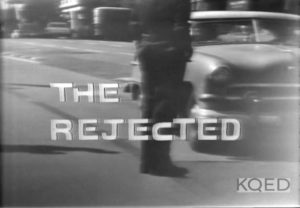 Sep 11: San Francisco’s KQED Airs “The Rejected.” The hour-long documentary airs at 9:30 p.m. on a Monday evening. Typical of most programs about homosexuality, “The Rejected” does not include lesbians. But it is perhaps the first scripted documentary to discuss homosexuality from a calm and rational point of view. Response is mostly positive. KQED is inundated with letters following the broadcast, with many of them requests for transcripts. Only a tiny minority, 3% according to station officials, write to complain. The San Francisco Chronicle says, “KQED handled the subject soberly, calmly and in great depth.” The program comes on the heals of the city’s Gayola scandal, the Tay-Bush Inn raid, and a stepped-up anti-gay campaign waged by San Francisco police. “The Rejected” receives national notice, and will be broadcast on several other public TV stations between 1961 and 1963, including in Tucson, Los Angeles, Portland and New York.
Sep 11: San Francisco’s KQED Airs “The Rejected.” The hour-long documentary airs at 9:30 p.m. on a Monday evening. Typical of most programs about homosexuality, “The Rejected” does not include lesbians. But it is perhaps the first scripted documentary to discuss homosexuality from a calm and rational point of view. Response is mostly positive. KQED is inundated with letters following the broadcast, with many of them requests for transcripts. Only a tiny minority, 3% according to station officials, write to complain. The San Francisco Chronicle says, “KQED handled the subject soberly, calmly and in great depth.” The program comes on the heals of the city’s Gayola scandal, the Tay-Bush Inn raid, and a stepped-up anti-gay campaign waged by San Francisco police. “The Rejected” receives national notice, and will be broadcast on several other public TV stations between 1961 and 1963, including in Tucson, Los Angeles, Portland and New York.![]() Sep 18: UN Secretary General Dag Hammarskjöld dies in a plain crash in Congo.
Sep 18: UN Secretary General Dag Hammarskjöld dies in a plain crash in Congo.
![]()
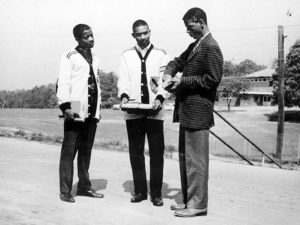 Sep 18: The Georgia Institute of Technology in Atlanta integrates peacefully with three African-American students among the freshman class. Georgia Tech officials began planning for the inevitable day four months ago after seeing the negative publicity surrounding the integration of the University of Georgia. It helps that two weeks earlier, Atlanta’s peaceful integration of its public schools earned praise in the national press. When Ford Greene, Lawrence Michael Williams, and Ralph Long, Jr., attend classes without incident, Georgia Tech becomes the first institution of higher education in the Deep South to integrate peacefully and without a court order.
Sep 18: The Georgia Institute of Technology in Atlanta integrates peacefully with three African-American students among the freshman class. Georgia Tech officials began planning for the inevitable day four months ago after seeing the negative publicity surrounding the integration of the University of Georgia. It helps that two weeks earlier, Atlanta’s peaceful integration of its public schools earned praise in the national press. When Ford Greene, Lawrence Michael Williams, and Ralph Long, Jr., attend classes without incident, Georgia Tech becomes the first institution of higher education in the Deep South to integrate peacefully and without a court order.
![]() Sep 19: Yevgeny Yevtushenko’s poem Babi Yar is published in the official Soviet literary magazine Literaturnaya Gazeta. This marks the Soviet Union’s first official acknowledgement of the Holocaust. The poem is notable for criticizing Soviet distortions of the Holocaust and the widespread anti-Semitism that is still widespread in the U.S.S.R.
Sep 19: Yevgeny Yevtushenko’s poem Babi Yar is published in the official Soviet literary magazine Literaturnaya Gazeta. This marks the Soviet Union’s first official acknowledgement of the Holocaust. The poem is notable for criticizing Soviet distortions of the Holocaust and the widespread anti-Semitism that is still widespread in the U.S.S.R.
![]()
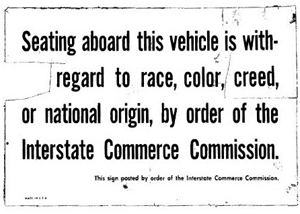 Sep 22: The Interstate Commerce Commission issues a rule requiring all interstate busses in the U.S. to display signs reading, “Seating aboard this vehicle is without regard to race, color, creed, or national origin, by order of the Interstate Commerce Commission.” The same order prohibits interstate buses from using segregated terminals and facilities. The Freedom Riders see the order as a victory, and suspend further Freedom Rides.
Sep 22: The Interstate Commerce Commission issues a rule requiring all interstate busses in the U.S. to display signs reading, “Seating aboard this vehicle is without regard to race, color, creed, or national origin, by order of the Interstate Commerce Commission.” The same order prohibits interstate buses from using segregated terminals and facilities. The Freedom Riders see the order as a victory, and suspend further Freedom Rides.
![]()
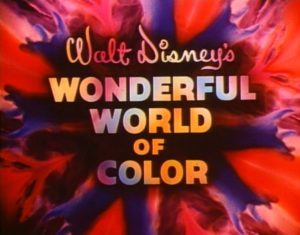 Sep 24: Walt Disney’s Wonderful World of Color premieres on NBC. The program is credited for doubling the sales of color television sets within its first year.
Sep 24: Walt Disney’s Wonderful World of Color premieres on NBC. The program is credited for doubling the sales of color television sets within its first year.
![]() Sep 28: The United Arab Republic, which united Egypt and Syria into a single country under Egyptian Rule in 1958, comes to an end when a coup in Damascus results in Syria leaving the UAR.
Sep 28: The United Arab Republic, which united Egypt and Syria into a single country under Egyptian Rule in 1958, comes to an end when a coup in Damascus results in Syria leaving the UAR.
| ◄ | October | ► | ▲ | |||
|---|---|---|---|---|---|---|
| 1 | 2 | 3 | 4 | 5 | 6 | 7 |
| 8 | 9 | 10 | 11 | 12 | 13 | 14 |
| 15 | 16 | 17 | 18 | 19 | 20 | 21 |
| 22 | 23 | 24 | 25 | 26 | 27 | 28 |
| 29 | 30 | 31 | ||||
![]() Oct 2: Dr. Kildare premieres on NBC.
Oct 2: Dr. Kildare premieres on NBC.
![]() Oct 3: The Dick Van Dyke Show premieres on CBS.
Oct 3: The Dick Van Dyke Show premieres on CBS.
![]() Oct 12: The New Zealand House of Representatives votes 41-30 to abolish capital punishment for all crimes except treason.
Oct 12: The New Zealand House of Representatives votes 41-30 to abolish capital punishment for all crimes except treason.
![]()
 Oct 17: As many as 200 peaceful demonstrators are killed by French police in what will be known as the Paris Massacre. Police fire on a crowd of 30,000 people protesting a curfew applying solely to Algerian Muslims in Paris. About a third of the protesters, 11,538 of them, are arrested and held in stadiums on the outskirts of Paris. Police Chief Maurice Papon, who ordered the crackdown, will be put on trial in 1988 for collaborating with the Nazis during World War II. But no one will ever be held accountable for the 1961 massacre.
Oct 17: As many as 200 peaceful demonstrators are killed by French police in what will be known as the Paris Massacre. Police fire on a crowd of 30,000 people protesting a curfew applying solely to Algerian Muslims in Paris. About a third of the protesters, 11,538 of them, are arrested and held in stadiums on the outskirts of Paris. Police Chief Maurice Papon, who ordered the crackdown, will be put on trial in 1988 for collaborating with the Nazis during World War II. But no one will ever be held accountable for the 1961 massacre.
![]() Oct 18: The film West Side Story is released.
Oct 18: The film West Side Story is released.
![]() Oct 24: Ohio prohibits solicitation to engage in “an unnatural act.” Anyone who picks up someone else in a bar, regardless of gender, for anything other than heterosexual intercourse can now be imprisoned for up to six months and/or fined $200. The defendant can also be institutionalized indefinitely under the state’s sexual psychopath law.
Oct 24: Ohio prohibits solicitation to engage in “an unnatural act.” Anyone who picks up someone else in a bar, regardless of gender, for anything other than heterosexual intercourse can now be imprisoned for up to six months and/or fined $200. The defendant can also be institutionalized indefinitely under the state’s sexual psychopath law.
![]()
 Oct 30: The Soviet Union detonates a 58-megaton hydrogen bomb, in the largest man-made explosion ever. The fireball is visible almost 600 miles away, window panes are broken 550 miles away, and the shock wave is felt 430 miles away.
Oct 30: The Soviet Union detonates a 58-megaton hydrogen bomb, in the largest man-made explosion ever. The fireball is visible almost 600 miles away, window panes are broken 550 miles away, and the shock wave is felt 430 miles away.
| ◄ | November | ► | ▲ | |||
|---|---|---|---|---|---|---|
| 1 | 2 | 3 | 4 | |||
| 5 | 6 | 7 | 8 | 9 | 10 | 11 |
| 12 | 13 | 14 | 15 | 16 | 17 | 18 |
| 19 | 20 | 21 | 22 | 23 | 24 | 25 |
| 26 | 27 | 28 | 29 | 30 | ||
 Nov 7: José Sarria Runs for San Francisco City Supervisor. He lost, of course, but he also won by losing. Before throwing his tiara into the ring, José Sarria is better known as a drag performer and waiter at San Francisco’s Black Cat bar, where he regales audiences with campy versions of Italian opera. The recent anti-gay campaigns being waged by city police and state agents convinces him to run for the San Francisco Board of supervisors. In doing so, Sarria becomes the first openly gay candidate for public office in the United States. The elections are for five at-large seats in which the top five vote-getters citywide are seated. Sarria almost wins by default until city officials, realizing what Sarria might just get a seat, put out a call for more candidates at the last minute. Thirty-four candidates end up running for the five slots. On election day, Sarria’s 6,000 votes puts him in ninth place. He doesn’t make it onto the Board of Supervisors, but it does define a significant voting block that will not be ignored in future elections. “From that day on,” Sarria could late brag, “nobody ran for anything in San Francisco without knocking on the door of the gay community.”
Nov 7: José Sarria Runs for San Francisco City Supervisor. He lost, of course, but he also won by losing. Before throwing his tiara into the ring, José Sarria is better known as a drag performer and waiter at San Francisco’s Black Cat bar, where he regales audiences with campy versions of Italian opera. The recent anti-gay campaigns being waged by city police and state agents convinces him to run for the San Francisco Board of supervisors. In doing so, Sarria becomes the first openly gay candidate for public office in the United States. The elections are for five at-large seats in which the top five vote-getters citywide are seated. Sarria almost wins by default until city officials, realizing what Sarria might just get a seat, put out a call for more candidates at the last minute. Thirty-four candidates end up running for the five slots. On election day, Sarria’s 6,000 votes puts him in ninth place. He doesn’t make it onto the Board of Supervisors, but it does define a significant voting block that will not be ignored in future elections. “From that day on,” Sarria could late brag, “nobody ran for anything in San Francisco without knocking on the door of the gay community.”![]() Nov 10: Catch-22 by Joseph Heller is published.
Nov 10: Catch-22 by Joseph Heller is published.
![]() Nov 12: Jimmy Dean’s single “Big Bad John” begins its five week run at the top of the charts.
Nov 12: Jimmy Dean’s single “Big Bad John” begins its five week run at the top of the charts.
![]()
 Nov 22: The Elvis Presley film Blue Hawaii is released.
Nov 22: The Elvis Presley film Blue Hawaii is released.
![]() Nov 26: West German pharmaceutical manufacturer Grünenthal GmbH is the first company to take thalidomide off of the market. Given to pregnant mothers as a morning sickness preventative, thalidomide was linked to birth defects in a report published in West Germany nine days earlier.
Nov 26: West German pharmaceutical manufacturer Grünenthal GmbH is the first company to take thalidomide off of the market. Given to pregnant mothers as a morning sickness preventative, thalidomide was linked to birth defects in a report published in West Germany nine days earlier.
| ◄ | December | ▲ | ||||
|---|---|---|---|---|---|---|
| 1 | 2 | |||||
| 3 | 4 | 5 | 6 | 7 | 8 | 9 |
| 10 | 11 | 12 | 13 | 14 | 15 | 16 |
| 17 | 28 | 19 | 20 | 21 | 22 | 23 |
| 24 | 25 | 26 | 27 | 28 | 29 | 30 |
| 31 | ||||||
![]() Dec 9: The former British colony of Tanganyika achieves independence. In 1963, Tanganyika will merge with Zanzibar to become Tanzania.
Dec 9: The former British colony of Tanganyika achieves independence. In 1963, Tanganyika will merge with Zanzibar to become Tanzania.
![]()
 Dec 11: Adolf Eichmann is found guilty of crimes against humanity by a three-judge panel in Israel. He will be sentenced to death on December 15.
Dec 11: Adolf Eichmann is found guilty of crimes against humanity by a three-judge panel in Israel. He will be sentenced to death on December 15.
![]() Dec 11: The Vietnam War officially begins for the United States when the USS Core arrives in Saigon Harbor. The ship brings with it two helicopter units with 33 H-21 Shawnee helicopters, and 400 U.S. Army personnel.
Dec 11: The Vietnam War officially begins for the United States when the USS Core arrives in Saigon Harbor. The ship brings with it two helicopter units with 33 H-21 Shawnee helicopters, and 400 U.S. Army personnel.
![]() Dec 16: Umkhonto we Sezwe (The Spear of the Nation), the newly-formed armed wing of the African National Congress, begins a bombing campaign against empty government buildings in Johannesburg, Port Elizabeth and Durban. The Manifesto of Umkonto is published the same day. It begins: “The time comes in the life of any nation when there remain only two choices — submit or fight. That time has now come to South Africa. We shall not submit and we have no choice but to hit back by all means in our power in defence of our people, our future, and our freedom.”
Dec 16: Umkhonto we Sezwe (The Spear of the Nation), the newly-formed armed wing of the African National Congress, begins a bombing campaign against empty government buildings in Johannesburg, Port Elizabeth and Durban. The Manifesto of Umkonto is published the same day. It begins: “The time comes in the life of any nation when there remain only two choices — submit or fight. That time has now come to South Africa. We shall not submit and we have no choice but to hit back by all means in our power in defence of our people, our future, and our freedom.”
![]() Dec 16: The British medical journal The Lancet publishes an urgent letter from Dr. W.G. McBride, an Australian obstetrician, warning of the link between the anti-morning sickness treatment thalidomide and birth defects in infants. “Congenital abnormalities are present in approximately 1.5% of babies,” he writes. “In recent months, I have observed that the incidence of multiple severe abnormalities in babies delivered of women who were given the drug thalidomide during pregnancy… to be almost 20%.” Distillers Company Ltd. will remove the drug from British distribution on December 21.
Dec 16: The British medical journal The Lancet publishes an urgent letter from Dr. W.G. McBride, an Australian obstetrician, warning of the link between the anti-morning sickness treatment thalidomide and birth defects in infants. “Congenital abnormalities are present in approximately 1.5% of babies,” he writes. “In recent months, I have observed that the incidence of multiple severe abnormalities in babies delivered of women who were given the drug thalidomide during pregnancy… to be almost 20%.” Distillers Company Ltd. will remove the drug from British distribution on December 21.
![]() Dec 20: The second Rock Hudson/Doris Day film, Lover Come Back is released.
Dec 20: The second Rock Hudson/Doris Day film, Lover Come Back is released.
![]() Dec 25: Pope John XVIII issues the papal bull Humanae salutis (“Of human salvation”) to summon the Second Vatical Council. The move surprises everyone in that the Pope did not consult with advisors beforehand.
Dec 25: Pope John XVIII issues the papal bull Humanae salutis (“Of human salvation”) to summon the Second Vatical Council. The move surprises everyone in that the Pope did not consult with advisors beforehand.
![[Emphasis Mine]](http://jimburroway.com/wp-content/uploads/2018/02/Witnesses.jpg)